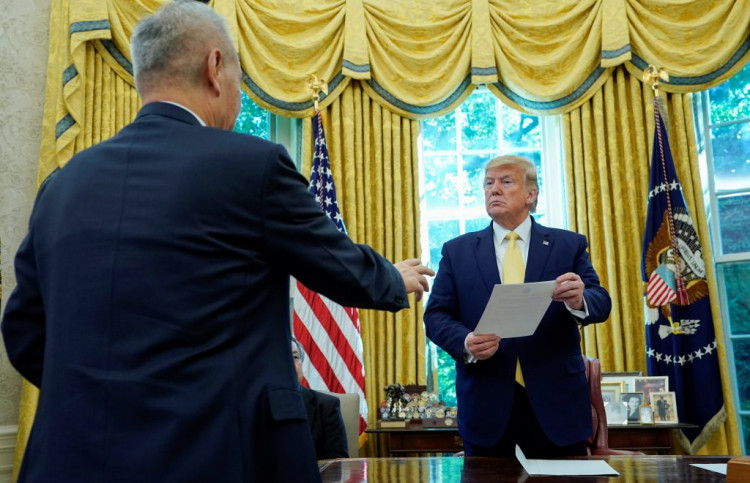President Donald Trump's threat to levy more and higher tariffs on China ignited a widespread Wall Street retreat Wednesday that saw the Dow Jones Industrial Average continue to fall farther away from the record 28,000 points it set Nov. 15. The S&P 500 and the NASDAQ Composite also continued to decline.
The Dow shed 114 points, or 0.4%, to 27,821.09 after opening at 27,879.55. The S&P 500 fell to 3,108.46, a 0.4% decline while the NASDAQ Composite dropped 0.5% to 8,526.73. Particularly hard hit by the retreat were companies with significant exposure to China. Among these are Apple Inc. and Caterpillar Inc., whose shares each fell 1.2%. Semiconductor firm Broadcom Inc. gave up 1.9% while Analog Devices Inc. and Qualcomm Inc. both lost more than 2%. The VanEck Vector Semiconductor ETF (SMH) ended the day 1% lower.
Analysts expect the dour mood on Wall Street to batter stocks Thursday in the wake of the stunning testimony by U.S. ambassador to the European Union Gordon Sondland before the House Intelligence Committee.
Testifying under oath, Sondland said he "followed the directions of the President" in making U.S. military aid to Ukraine contingent on that country's investigating former vice president Joe Biden. He emphasized this was a quid-pro-quo, saying: "Was there a 'quid pro quo?' As I testified previously, with regard to the requested White House call and White House meeting, the answer is yes."
Analysts said Trump's weakened political position will negatively impact the stalled phase one trade deal negotiations with China, which is enough to concern Wall Street as it heads into the weekend.
"The market is having more trouble navigating this landscape and it's primarily due to the fact that the trade situation has stalled," said Daniel Deming, managing director at KKM Financial, a boutique investment firm based in Chicago.
Media reports now say phase one negotiations will resume in 2020. China still demands Trump rollback most of the tariffs he's imposed since April 2018 as part of any phase one deal. Trump has refused to do so.
Optimism over a phase one deal was also deflated after the Senate passed a bill supporting Hong Kong protesters demanding democracy from China. The House on Wednesday followed suit, passing a pro-Hong Kong rights bill. Congress' unanimity in supporting Hong Kong's pro-democracy protestors weakens Trump's hand in his ongoing negotiations with China.
The bipartisan bill supporting the Hong Kong protestors now goes to Trump for his signature. Trump's signing the bill into law will infuriate China and might kill phase one or force its indefinite postponement.
Trump on Tuesday said he will impose higher tariffs on Chinese goods if Beijing doesn't do phase one.
"If we don't make a deal with China, I'll just raise the tariffs even higher," said Trump at a Cabinet meeting.





